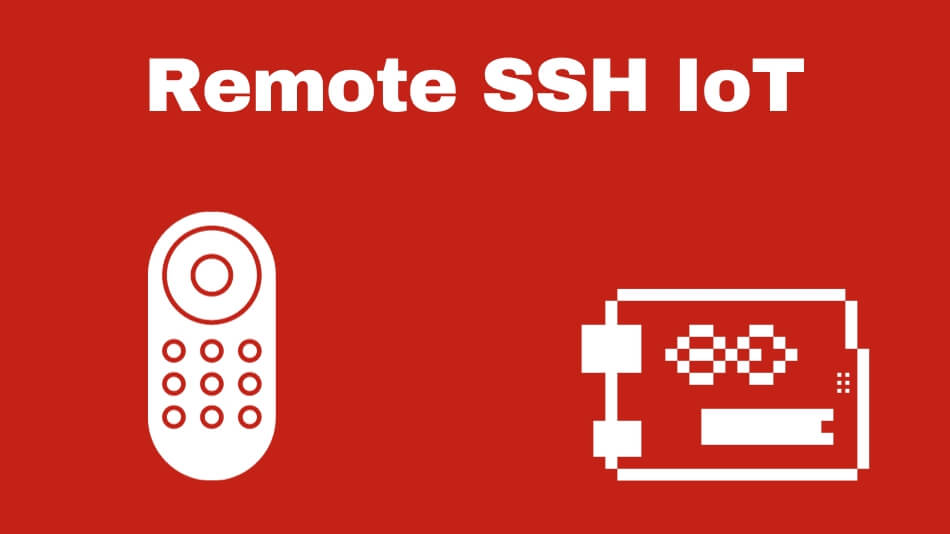How Do SSH Play Role In IoT? Unlocking The Secure Shell Power For Connected Devices
Let’s be honest, the Internet of Things (IoT) is everywhere these days, and it’s growing like crazy. You’ve got smart fridges, smart lights, smart cars, and even smart toothbrushes. But here’s the big question—how do we keep all these devices secure? That’s where SSH comes in. Secure Shell, or SSH for short, is like the secret weapon of cybersecurity when it comes to IoT. But how exactly does SSH play its role in IoT? Let’s dive deep into this and find out why it’s so important.
IoT devices are everywhere, and they’re only getting smarter. But with all this convenience comes a massive security challenge. That’s where SSH comes into play. It’s not just some random tech term; it’s a powerful tool that helps secure communication between devices. So, if you’re wondering how SSH fits into the IoT puzzle, you’re in the right place.
In this article, we’ll break down everything you need to know about SSH and its role in IoT. From the basics to advanced applications, we’ll cover it all. So, whether you’re a tech enthusiast or just curious about how your smart devices stay safe, keep reading.
- Christy Gnome Bikini Pics A Closer Look At The Viral Sensation Everyones Talking About
- Jackerman Warmth Part 3 Unveiling The Heartwarming Journey
Understanding IoT and Its Security Challenges
IoT, or the Internet of Things, is essentially a network of devices that can communicate with each other and with us. These devices range from simple home gadgets to complex industrial machines. But with this connectivity comes a whole host of security challenges.
One of the biggest problems is data security. IoT devices collect a ton of data, and if that data falls into the wrong hands, it can be a disaster. Hackers could access your personal information, control your devices, or even launch large-scale attacks. That’s why having a solid security protocol like SSH is crucial.
Common Security Threats in IoT
Here are some of the most common security threats in the IoT world:
- Alice Rosenbaum Onlyfans Leaks The Untold Story You Need To Know
- Hannah Barron Nude Leaks Unveiling The Truth Behind The Controversy
- Data breaches: Hackers can steal sensitive data from IoT devices.
- Device hijacking: Someone could take control of your devices remotely.
- Denial of Service (DoS) attacks: Attackers can overwhelm devices, making them unusable.
- Firmware vulnerabilities: Many IoT devices have outdated or insecure firmware.
These threats highlight why having a secure communication protocol is so important. SSH helps address many of these issues by providing a secure channel for data transmission.
What is SSH and Why Does It Matter?
SSH, or Secure Shell, is a cryptographic network protocol that allows secure communication over an unsecured network. It’s like having a private conversation in a crowded room. SSH encrypts all the data being transmitted, making it nearly impossible for hackers to intercept or decipher.
SSH is particularly important for IoT because it provides a secure way for devices to communicate with each other and with servers. Without SSH, data could be easily intercepted, leading to all kinds of security issues.
Key Features of SSH
Here are some of the key features that make SSH so valuable:
- Encryption: SSH encrypts all data being transmitted, keeping it safe from prying eyes.
- Authentication: SSH ensures that only authorized users or devices can access the network.
- Integrity: SSH ensures that the data being transmitted hasn’t been tampered with.
These features make SSH a perfect fit for IoT devices, where security is paramount.
The Role of SSH in IoT Security
Now that we understand what SSH is, let’s talk about how it plays a role in IoT security. SSH is like the backbone of secure communication in the IoT world. It ensures that data is transmitted securely between devices, servers, and users.
One of the main ways SSH helps in IoT is by securing remote access. Many IoT devices need to be accessed remotely for maintenance or updates. Without SSH, this could be a huge security risk. SSH ensures that only authorized users can access these devices, keeping them safe from hackers.
How SSH Secures IoT Devices
Here’s how SSH helps secure IoT devices:
- Secures remote access: SSH ensures that only authorized users can access IoT devices remotely.
- Protects data transmission: SSH encrypts all data being transmitted between devices, keeping it safe from interception.
- Ensures device integrity: SSH helps ensure that the firmware and software on IoT devices haven’t been tampered with.
These features make SSH an essential tool for securing IoT devices.
SSH in IoT Communication
Communication is key in the IoT world, and SSH plays a critical role in ensuring that communication is secure. Whether it’s a smart thermostat sending data to a server or a security camera streaming video to a user, SSH ensures that the data is transmitted safely.
SSH is especially important in IoT communication because it provides end-to-end encryption. This means that the data is encrypted from the moment it leaves the device until it reaches its destination. This level of security is crucial for protecting sensitive information.
Benefits of Using SSH for IoT Communication
Here are some of the benefits of using SSH for IoT communication:
- Enhanced security: SSH provides strong encryption, making it difficult for hackers to intercept data.
- Improved reliability: SSH ensures that data is transmitted accurately and without errors.
- Scalability: SSH can handle large volumes of data, making it ideal for IoT networks with many devices.
These benefits make SSH a top choice for securing IoT communication.
Implementing SSH in IoT Devices
Implementing SSH in IoT devices isn’t as complicated as it might sound. Most modern IoT devices come with SSH support built-in, making it easy to set up secure communication. However, there are a few things to keep in mind when implementing SSH in IoT devices.
First, you need to ensure that the devices are properly configured. This includes setting up strong passwords, enabling encryption, and configuring firewalls. It’s also important to regularly update the firmware on IoT devices to ensure they have the latest security patches.
Best Practices for Implementing SSH in IoT
Here are some best practices for implementing SSH in IoT devices:
- Use strong passwords: Weak passwords are a common vulnerability, so make sure to use strong, unique passwords for each device.
- Enable encryption: Always enable encryption to protect data transmission.
- Regularly update firmware: Keep your devices up to date with the latest security patches.
By following these best practices, you can ensure that your IoT devices are as secure as possible.
SSH and IoT Data Privacy
Data privacy is a major concern in the IoT world, and SSH plays a crucial role in protecting it. With so much sensitive data being transmitted between devices, it’s essential to have a secure communication protocol in place.
SSH helps protect IoT data privacy by encrypting all data transmissions. This means that even if someone intercepts the data, they won’t be able to read it without the encryption key. SSH also ensures that only authorized users can access the data, further enhancing privacy.
How SSH Protects IoT Data Privacy
Here’s how SSH helps protect IoT data privacy:
- Data encryption: SSH encrypts all data transmissions, keeping them secure from interception.
- User authentication: SSH ensures that only authorized users can access the data.
- Device integrity: SSH helps ensure that the data hasn’t been tampered with during transmission.
These features make SSH an essential tool for protecting IoT data privacy.
SSH and IoT Network Security
Network security is another area where SSH plays a critical role in IoT. With so many devices connected to a single network, it’s essential to have a secure communication protocol in place. SSH helps ensure that the network remains secure by encrypting all data transmissions and authenticating users and devices.
SSH is especially important for IoT network security because it provides a secure channel for device management. Whether it’s updating firmware or troubleshooting issues, SSH ensures that all communication between devices and servers is secure.
How SSH Enhances IoT Network Security
Here’s how SSH enhances IoT network security:
- Secure device management: SSH provides a secure channel for managing IoT devices.
- Network encryption: SSH encrypts all data transmissions on the network, keeping them secure.
- Authentication: SSH ensures that only authorized users and devices can access the network.
These features make SSH an essential tool for securing IoT networks.
SSH in IoT Security Protocols
SSH is often used as part of larger IoT security protocols. It works alongside other security measures to provide comprehensive protection for IoT devices and networks. By integrating SSH into existing security protocols, organizations can ensure that their IoT systems are as secure as possible.
SSH is particularly useful in IoT security protocols because it provides a secure foundation for building more advanced security measures. Whether it’s integrating SSH with firewalls or using it as part of a larger encryption strategy, SSH is a versatile tool that can be adapted to meet the needs of any IoT system.
Integrating SSH with Other IoT Security Measures
Here’s how SSH can be integrated with other IoT security measures:
- Firewalls: SSH can be used in conjunction with firewalls to provide an additional layer of security.
- Encryption: SSH can be combined with other encryption protocols to enhance data security.
- Authentication: SSH can be integrated with multi-factor authentication systems to ensure secure access.
By integrating SSH with other security measures, organizations can create a robust security framework for their IoT systems.
Future Trends in SSH and IoT Security
As the IoT landscape continues to evolve, so too will the role of SSH in securing it. New technologies and advancements in cybersecurity are likely to enhance the capabilities of SSH, making it even more effective in protecting IoT devices and networks.
One trend to watch is the increasing use of quantum cryptography in IoT security. While still in its early stages, quantum cryptography has the potential to revolutionize how we secure IoT devices. SSH could play a key role in integrating this technology into existing security protocols.
Emerging Technologies in SSH and IoT Security
Here are some emerging technologies that could impact SSH and IoT security:
- Quantum cryptography: This new technology could enhance the security of SSH in IoT systems.
- AI-driven security: Artificial intelligence could be used to enhance SSH’s ability to detect and respond to threats.
- Blockchain: Blockchain technology could be integrated with SSH to provide even more secure communication.
These emerging technologies could shape the future of SSH in IoT security, making it even more effective in protecting connected devices.
Conclusion
So, there you have it—a deep dive into how SSH plays a critical role in IoT security. From securing remote access to protecting data privacy and enhancing network security, SSH is an essential tool for anyone working with IoT devices. By understanding how SSH works and implementing best practices, you can ensure that your IoT systems are as secure as possible.
Remember, security is an ongoing process. As new threats emerge, it’s important to stay up to date with the latest security protocols and technologies. So, whether you’re a tech enthusiast or a business owner, make sure to prioritize IoT security and consider SSH as a key component of your security strategy.
Now that you know how SSH plays its role in IoT, why not share this article with your friends or leave a comment below? Let’s keep the conversation going and help make the IoT world a safer place for everyone.
Table of Contents
- How Do SSH Play Role in IoT?
- Understanding IoT and Its Security Challenges
- Common Security Threats in IoT
- What is SSH and Why Does It Matter?
- Key Features of SSH
- The Role of SSH in IoT Security
- How SSH Secures IoT Devices
- SSH in IoT Communication
- Benefits of Using SSH for IoT Communication
- Implementing SSH in IoT Devices
- Best Practices for Implementing SSH in IoT



Detail Author:
- Name : Edna Kautzer
- Username : baumbach.sharon
- Email : mcclure.vincent@yahoo.com
- Birthdate : 1987-04-14
- Address : 9240 Jast Junctions Suite 923 South Mabellestad, NH 24630-8611
- Phone : +1 (848) 691-8975
- Company : Marks-Hudson
- Job : Airline Pilot OR Copilot OR Flight Engineer
- Bio : Quas quo quia error voluptatem rerum sed aut sunt. Omnis non consequatur ab labore quod quia. Rerum ab omnis amet. Totam praesentium quaerat ex sunt. Expedita facilis enim quaerat sint cum quo.
Socials
tiktok:
- url : https://tiktok.com/@marlon944
- username : marlon944
- bio : Et nobis non voluptatum distinctio quisquam.
- followers : 4807
- following : 1641
twitter:
- url : https://twitter.com/marlonhaag
- username : marlonhaag
- bio : Sit impedit suscipit voluptatem. Consequuntur quisquam sunt dolorum maiores debitis veritatis.
- followers : 6555
- following : 1565
instagram:
- url : https://instagram.com/marlon67
- username : marlon67
- bio : Vitae qui eaque sed quaerat. Velit consequatur provident cumque dolor officiis suscipit.
- followers : 1972
- following : 1129
facebook:
- url : https://facebook.com/marlon_xx
- username : marlon_xx
- bio : Sed ea consequuntur quis hic officia sed ipsum.
- followers : 6913
- following : 1203
linkedin:
- url : https://linkedin.com/in/marlonhaag
- username : marlonhaag
- bio : Similique sed eligendi sed a animi magni vel.
- followers : 243
- following : 1659